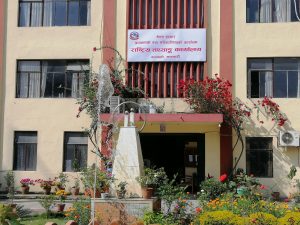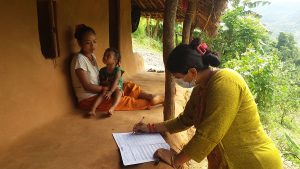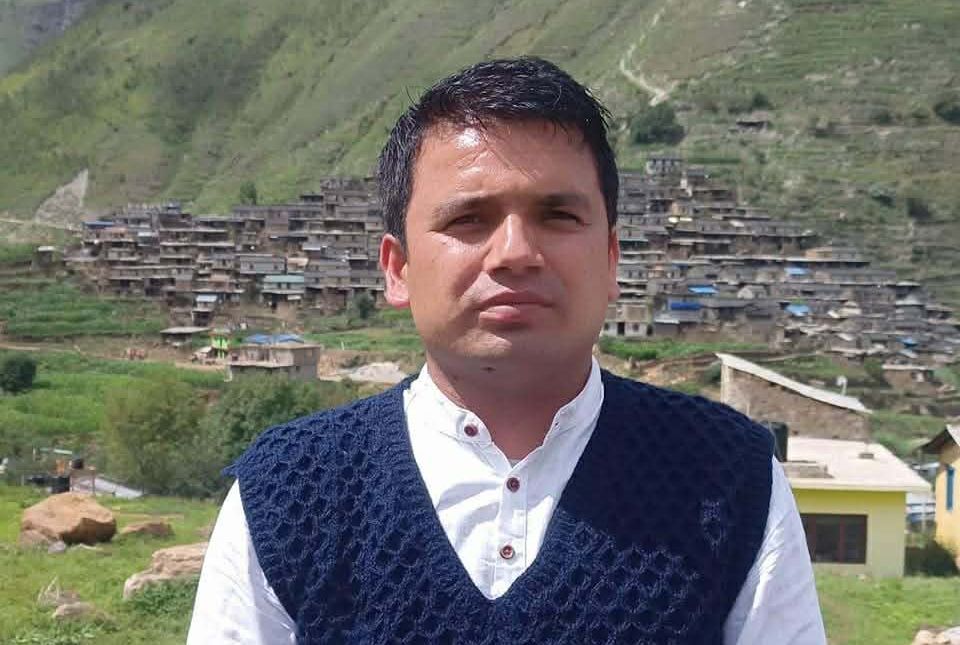
Recently, the government of Nepal has been taking decisions one after another for controlling the Covid-19 in the country. Long-haul bus service and international flights have been suspended whereas quarantine spots have been prepared. Major hospitals have been told to add ICU beds.
However, the head of the critical care unit of Tribhuvan University Teaching Hospital (TUTH), Dr. Subhash Acharya is not satisfied with the steps taken as the government is not focused on ‘small but important’ decisions regarding the preparation for coping with the coronavirus. “The truth may sound bitter, but the situations would be disastrous under these circumstances. If a Covid-19 patient comes, it may create chaos among the health professionals,” he says in a recent interview with Onlinekhabar.
Excerpts:
How do you see Nepal’s current preparation as the fear of Covid-19 looms large globally?
The World Health Organization has recently declared Covid-19 a pandemic and the number of cases is growing and it is spreading throughout the world. Countries like Italy and the USA have not been able to contain the disease. There are not enough human resources as well as technology to cope with it.
Observing all this, we cannot remain unconcerned just because Nepal is yet to be affected by the pandemic. We will not be able to deal with it regardless of all the preparations we have done. So we need to be scared the most.
Almost every governmental body looks preparing for the spread of the pandemic. Seeing all these activeness, why should we be scared?
From the outside, it looks like the government is taking all the right steps to control the spread. Many decisions are being taken through meetings. And it does give a positive message.
But, all these decisions look good on papers. And, we can only feel relieved until the coronavirus infection case arrives here. When it happens, we will know that we have not prepared enough. Despite all these decisions, the government could not track the travellers who had arrived from infected countries. They should have been quarantined and banned from any mobility. But, they have not been stopped from moving around.
What is happening and what should have happened in these circumstances?
I will give you an example. Where should a person go if they have flu-like symptoms and fever, and how should they go? It has not been decided yet.
The government has ordered every hospital to run a fever clinic on its premises. If you observe the TUTH, you can see such a clinic run under a tent. What should a doctor wear in these clinics if a patient comes with Covid-19 symptoms when there is no personal protective equipment (PPE)? Other hospitals do not have these either. If the Health Ministry claims that there are enough PPEs, it shall be able to distribute them. If it does not have them, it should bring them from anywhere anyhow.
The government has designated five hospitals for Covid-19 treatment, which is a good thing. But how should a suspected person travel to these hospitals? By a public bus? That would increase the chance of others getting infected.
The government should have made a protocol of transporting a suspected case already. For example, it should have had a few ambulances standby to carry these patients. But a person with the symptoms needs to go to the hospital by themselves here.
What is the hotline number for you to contact if you suspect that you are infected? Where are the PPEs for the ambulance driver and the medical persons accompanying them? Where are the doctors and other medical personnel who would look after the suspected cases? Should the same doctor look after the Covid-19 patients and other patients? The persons undergoing tests must be quarantined. Where should the person be sent if they need medical attention in the quarantine? And where is the ICU if the person needs critical care?
The decisions should have had been taken on these critical questions. But, the decisions taken here are focused on increasing the ICU beds only. There are no preparations whatsoever regarding every other thing related to the infection before even taking these patients to the ICU. The decisions should be made on protocols to transport a suspicious patient to the hospitals and how to treat them, and also on the safety of the ambulance drivers and the health workers.

But, was it a bad decision to add the number of ICU beds in most of the hospitals?
There will be total chaos in the hospitals if the decisions are only centred on increasing the ICU beds instead of preparation required the initial phases. And that is normal, because how would a medical professional treat a patient without any essential gear? They would need to protect themselves at least.
No doctors would look after patients without the PPEs. An ambulance driver would not agree to transport suspicious patients without the PPEs. A soldier needs his tools before going to a battle; no one wins a battle with the sticks. And it would be unethical for the government to send these soldiers to the battlefield without their weapons.
Suppose you come to me for treatment suspecting yourself as a Covid patient. And if you test positive and if I treat you without the PPEs, not just me but the other patients I treat would also get infected. That is why I am insisting on preparations for other things and not just the ICU.
However, the government has taken good decisions on barring international inbound flights and reducing the crowd. The decision to shut down everything except the essential services is highly appreciable. It is alright to shut down everything except the health services, and food and other essential supplies. But there are not adequate decisions related to hospitals.
So you mean the preparations are inadequate?
The decisions look good on papers, but the reality is: they have not been implemented.
As I told you earlier, there should be a protocol to carry a suspicious person in the first place. Then, adequate PPEs should be compulsorily given to medical professionals and ambulance drivers. Third, there should be a proper quarantine spot for suspicious patients. Fourth, a hospital is needed to treat a serious patient and then only the ICU. Preparations for the ICUs without preparations for the basics will result in a surge of infected patients.
What will be the difficulty to set up multiple hospitals to treat Covid-19 patients?
Around 250 people with other diseases go to Shukraraj Hospital (Teku) for treatment. If a coronavirus infected patient is admitted there, can it be guaranteed that other people will not be infected? Patan Hospital and Bir Hospital are also designated for the treatment of Covid-19 patients, and the government has decided to add 20 ICU beds each. This decision can be disastrous as people with other conditions will also visit the hospital.
So it is necessary to designate a hospital for the treatment of Covid-19 only. I am not calling for building a new hospital in a day. What I am trying to say is that the other patients of these hospitals should be transferred elsewhere which could minimise the spreading. Nepal Army Hospital, Police Hospital, Ayurveda Hospital of Kirtipur or other hospitals would be ideal for treating the Covid-19 patients only.
Is it practical to designate one hospital for the treatment of Covid-19 patients and transferring other cases to other hospitals?
Yes, if the government wants. Maybe it will be difficult for those admitted to the critical care unit. But, it is a necessity. Admitting Covid-19 patients to the same hospitals can be deadly.
The Ayurveda Hospital in Kirtipur is only for the out-patients. No patients are admitted there. There are three blocks in the hospital. If the government wants, it can transform the hospital into a quarantine spot and critical care centre. Other empty buildings and some medical colleges can also be used for similar purposes.
Can an ICU be prepared instantly?
This is what people have misunderstood while they are focused on adding ICU beds. This is wrong. Only 25 people among 500 may need critical care. That is why it is important to designate a hospital for the treatment of these 500 people, not only 25. We must prepare for the safety of medical professionals involved in the treatment of these people.
This is not the right time to add ventilators to the hospitals because it is not possible at the moment. The ventilators need to be imported, which is not possible now. We need to focus on using and managing existing resources.
We have submitted a proposal to the Health Ministry for the training of doctors to work in the ICUs. If it sends medical professionals, we will provide training on infection control and critical care. But the government has not prioritised this.
What message will it give to the medical professionals?
The truth may sound bitter but the situations would be disastrous under these circumstances: if a patient with Covid-19 comes, it may create chaos among the health professionals. How can I treat Covid-19 patients without PPEs? Can I treat them without a protective suit and an N95 mask? Can I supervise other doctors to look after these patients? How will an ambulance driver bring a patient without ensuring his safety?
That is why I say that we cannot feel relieved by the preparations we have done. If the infection is all around and there are no PPEs, there will not be any option for the doctor, but to run away.
We still have time to prepare a hospital for Covid-19 treatment only and we should not rely on Teku Hospital, Patan Hospital and Bir Hospital only. We should decide promptly on the protocol to transport suspected patients. Otherwise, it will be chaos.
Doctor, you look so much pessimistic.
When I say all these, it might convey that the government has not done anything. It has done tremendous work; there have been meetings regularly; they are coming with new decisions every time. But there is no proper planning for the treatment of patients. They need to decide which doctors will work and how will they work? And is it right to designate multiple hospitals without knowing the capacity or doing proper research?
So what has been missing?
A major mistake of the government is not preparing for the treatment. We had requested for PPEs a month earlier, but they did not prioritise it. We are still recommending that the government evacuate a hospital for the treatment of Covid-19 patients separately. The officials are not listening to that either. How can we, the medical professionals, be assured to work without such preparations? How can people be assured?
We do not need additional doctors or nurses now, but we need the PPEs. Where are they? We need some effective medicines. Where are they? How can they say that we are ready to face the outbreak without even focusing on these small but important things? When we ask the Health Ministry about who will manage the PPEs, one official points to another. When will they be actually serious?
So how would you like to rate the preparations the government has made?
It would be very stupid to say that the coronavirus will not spread in Nepal when it has terrorised the whole world. Sooner or later, it will come. We are lucky to get enough time to prepare well for the outbreak. By ‘we’, I mean all the people and the institutions. Everyone must prepare for themselves.
But we are neither prepared nor are we skillful. I should not feel ashamed to say that. The coronavirus cannot be contained by preparing a few beds in a few hospitals. Should not we learn from how other countries have prepared? Why haven’t we learned anything? Why aren’t we prepared? Neither we have skilled human resources, nor do we have separate hospitals. So what is our preparation overall?
So what should the people and medical professionals do to help the government?
People can help the best by not forming a crowd, quarantining themselves, travelling less and washing hands with soap frequently.
Similarly, what medical professionals can do is prepare themselves voluntarily and look for possible ways to treat Covid-19 patients, and informing the people about the facts. The main work is of the government. If the government does what it needs to do, the people will follow suit.
























